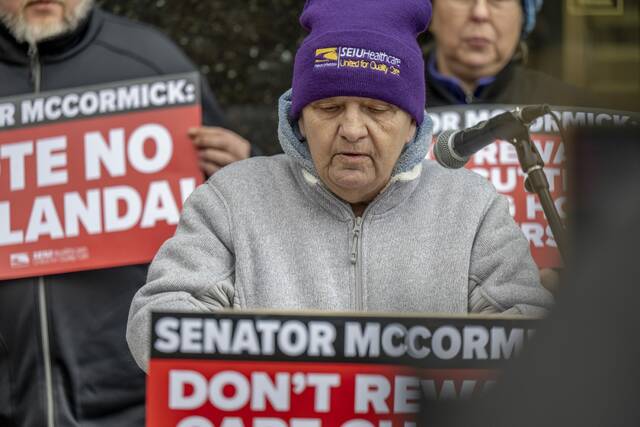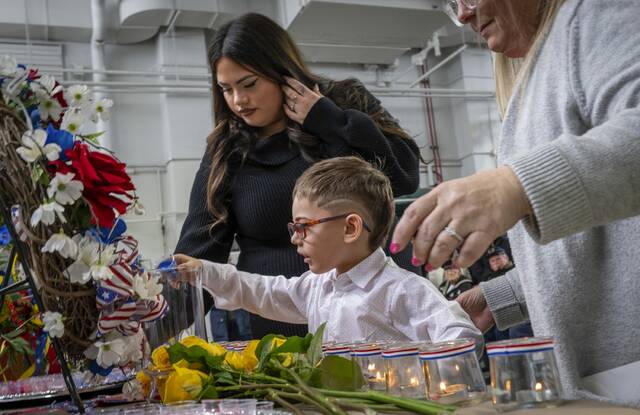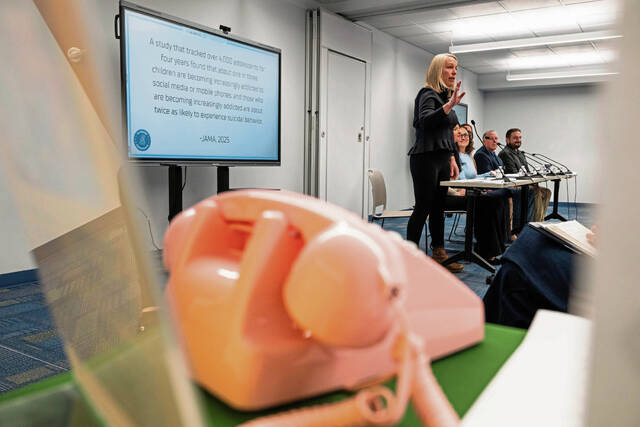With the U.S. government shut down, thousands of unionized federal workers throughout Western Pennsylvania are wondering whether they’ll still be allowed to do their jobs — and, if so, when they’ll get paid for it.
Elizabeth McPeak, first vice president of the National Treasury Employees Union Chapter 34, on Friday told TribLive the Treasury Department is using Inflation Reduction Act money to keep workers in their roles through Wednesday.
What happens next, she said, is uncertain.
The most essential federal employees may continue working but see their pay delayed until the shutdown is resolved. Others may be furloughed and unable to work — or collect a paycheck — at all.
“Here’s the bottom line: A government shutdown is bad for everybody,” McPeak said. “It’s bad for the American taxpayers, and it’s bad for federal workers.”
The shutdown doesn’t impact just federal employees in Washington, D.C. About 85% of federal workers live and work outside the D.C. area, including more than 66,000 federal employees throughout Pennsylvania.
About 19,000 of those employees are based in the Pittsburgh area. The Treasury, Energy and Veterans Affairs departments as well as the Army Corps of Engineers all have a substantial presence in the region.
The workers from various agencies represented by the National Treasury Employees Union Chapter 34 are largely assigned to the William S. Moorhead Federal Building in Downtown Pittsburgh, McPeak said. Others are scattered from Washington to Erie to Altoona.
“What people don’t realize is it’s happening to your neighbors,” she said. “We live and work in your community.”
The federal government shut down much of its operations Wednesday as Congress failed to reach a funding deal.
The shutdown — which some fear could be a lengthy standoff — could spur the loss of thousands of federal jobs, suspend scientific research, slow air travel and withhold pay from U.S. troops.
“It is possible there will be people who are working who will not get paid for weeks — or longer — which is inconceivable in America,” McPeak said. “This is just an absolute morale buster.”
Partisan messaging on the websites of various federal departments blamed Democrats for the shutdown — and may have violated ethics laws, experts said.
Ordinary Americans are also in limbo because of a halt in funding for an array of programs.
For now, many agencies are holding together their operations with residual funds.
Customer service roles, like call center representatives, could be among the first furloughs.
McPeak’s union represents workers who field calls from people who have questions about their taxes and advocate for taxpayers having issues with the IRS. They also conduct audits on domestic and international corporations, ensuring they pay their fair share in taxes.
Last year, federal workers in Pittsburgh answered roughly 1 million calls from taxpayers, McPeak said. That’s an average of roughly 3,000 calls per day — calls that will go unanswered if workers are furloughed while federal officials hammer out a spending plan.
“When there’s a shutdown, if we’re not working, those services stop,” McPeak said. “Our ask is that Congress does its job and come to a resolution. Keep us working.”
Uneven impacts
Kristina Schultz, vice president of the International Federation of Professional and Technical Engineers Local 96, said the Army Corps is operating as normal in Southwestern Pennsylvania, save for about a dozen furloughed interns.
Workers responsible for running locks and dams, dredging rivers and controlling floods are guaranteed another paycheck in the middle of the month, according to Schultz.
From there, employees could be sent home and projects put on pause.
“We want to be working and doing our jobs,” Schultz said.
Gov. Josh Shapiro on Friday said about 7,800 of the commonwealth’s 80,000 employees — nearly 10% — are in positions funded by federal dollars.
Shapiro said he received assurances from federal officials that those workers could continue to do their jobs and the commonwealth could continue to pay them. Pennsylvania will be reimbursed by the federal government for their wages after the shutdown, he said.
The governor said he hopes lawmakers in Washington “will find ways to work together” to end the shutdown quickly.
McPeak said the prospect of missed paychecks is stressful for federal workers who don’t know how long a shutdown could last.
“Right now, people are delaying home improvements, canceling vacations. Some people were getting ready to holiday shop — they’re putting that off,” she said. “We’re not going to spend any money we don’t have to spend because we don’t know if our pay is delayed, when we’re going to be paid.”
Not all agencies are in immediate danger of massive cuts and furloughs. The Department of Veterans Affairs’ Pittsburgh hospitals are funded about a year in advance, according to Lori Lydic, president of the American Federation of Government Employees Local 2028.
So far, only information technology employees have been impacted, she said.
Unspent funds from the last budget mean Department of Energy workers at the Bruceton Research Center in the South Hills will likely get their paychecks for another month, according to Lilas Soukup, president of the American Federation of Government Employees Local 1916.
But the National Institute for Occupational Safety and Health workers she represents — put on unpaid leave prior to the shutdown as part of a workforce reduction initiative by the Trump administration — have already had their pay cut off, Soukup said.
‘Not good for America’
The union is organizing to provide support to members who may struggle to cover essentials, like groceries and utilities, much like it did during the last shutdown, a 35-day affair starting in December 2018.
“The labor movement, ourselves, actually got the workers through the last one,” Soukup said,
Like workers in the Army Corps, members of the local chapter of the Treasury union are expecting to receive one more paycheck next weekend before their paychecks are paused.
“After that, we won’t get paid until the shutdown is over,” McPeak said.
It hurts local economies when federal workers tighten their purse strings, she said.
And it deters people from considering federal jobs for fear that more shutdowns will leave them in the “unfathomable” position of wondering when their next paycheck could materialize.
During the last shutdown, some of the Pittsburgh area workers in the National Treasury Employees Union continued to work without pay. Others faced forced furloughs.
McPeak described that shutdown — which dragged on for over a month — as devastating. It left federal workers seeking meals from food banks and scrambling to find help paying mortgages or rents, she said.
Some local businesses, she said, stepped in to offer help, including low-interest loans.
“It is not good for America when we are out of work,” McPeak said.








